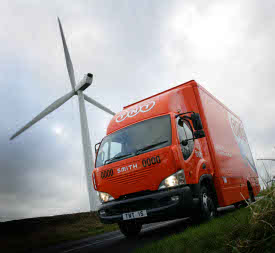Back in April, I wrote about a new partnership that was promising to deliver workable, cost-effective hydrogen filling stations in the not-too-distant future. ITM Power‘s goal is to develop a commercially-viable hydrogen filling station that actually generates its own hydrogen from water and electricity – not relying on deliveries by tanker lorries.
It seems that progress has already been made towards that goal. ITM Power are currently running a Ford Focus as a hydrogen demonstration vehicle for their filling station design. At present it only has a range (using one charge of hydrogen fuel) of 25 miles, but this can be increased to 100 miles by storing the hydrogen under greater pressure. The vehicle is bi-fuel and can be switched back to petrol whenever necessary.
Next month will see Roush Technologies, the company handling the vehicle engineering side of this project, start using a hydrogen-fuelled Ford Transit to demonstrate the capabilities of the system. The Transit, which features a supercharged 2.3 litre [petrol] engine, will be used to promote the benefits of hydrogen fuel to businesses and other van operators.
The system will be targeted at vans on short delivery runs in urban areas where returning to base to refuel is not an issue and where reduced emissions could well result in tax and operating cost reductions for the van operators.
ITM Power have managed to reduce the cost of the hydrogen fuelling stations by replacing the platinum membrane normally required with a specially-developed polymer. This has a cost of just 1% of the traditional design and is helping bring commercially-viable hydrogen fuel stations closer to reality.
ITM expect to go into volume production of hydrogen filling stations in the next couple of years and expect production units to cost a few thousand pounds. That seems cheap to me – although they will use a sizable amount of electricity, it is easy to imagine attractive cost savings in comparison to diesel.
For more details, see these stories in Logistics Manager and Fleet News.

 into use on urban routes and the vehicles will have a gross weight of 7.5 tonnes – territory currently occupied by diesel-powered vehicles.
into use on urban routes and the vehicles will have a gross weight of 7.5 tonnes – territory currently occupied by diesel-powered vehicles. has a supercharged 1.8 litre petrol engine, generates 156hp and can run on petrol, LNG or CNG. Drivers can switch between natural gas and petrol power and the combination of a full petrol tank and a full gas tank will give the van an impressive 1200km range, according to Mercedes.
has a supercharged 1.8 litre petrol engine, generates 156hp and can run on petrol, LNG or CNG. Drivers can switch between natural gas and petrol power and the combination of a full petrol tank and a full gas tank will give the van an impressive 1200km range, according to Mercedes.